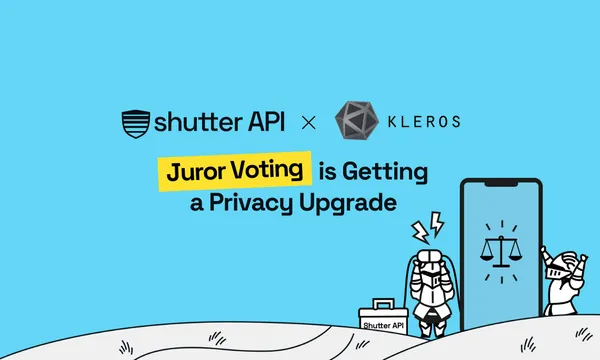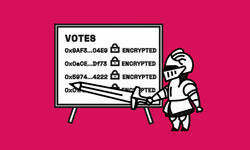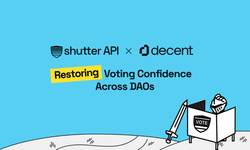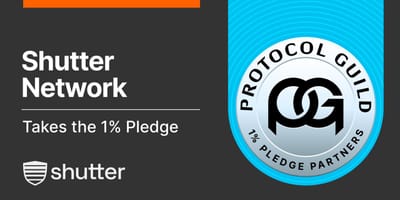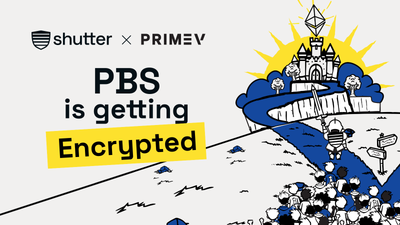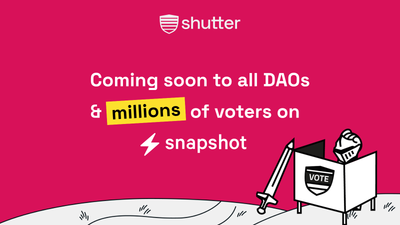Kleros, the decentralized “court” of Web3, is upgrading its juror voting system to be more private and user-friendly. By integrating Shutter API’s Shielded Voting into Kleros Court V2, jurors will be able to cast secret votes that remain hidden until the case is closed - without the hassle of a two-step commit-reveal process. In short, Kleros is bolstering decentralized justice, ensuring more fair outcomes with less friction, utilizing the cryptographic guarantees of Shutter API.
Why Privacy Matters in a Kleros Decentralized Court
In a Kleros court, anyone around the world can be randomly selected as a juror (after staking Kleros’s token PNK) to adjudicate cases - from escrow disagreements to verifying curated lists. The promise of Kleros is justice without a central authority: jurors independently review evidence and vote on the outcome, and the majority decision of the final round wins.
For this system to work, trust in the voting process is paramount. Jurors must be able to decide cases impartially, without outside influence or fear of retaliation. That’s why private voting - keeping each juror’s vote secret until the verdict is final - is so important.
Kleros’s game theory makes voter privacy even more critical. The Kleros court incentivizes jurors to vote in line with the true outcome by rewarding those who end up in the majority (and penalizing those in the minority). This clever mechanism (a form of Schelling game) is meant to encourage honest, well-reasoned votes – ideally, the majority will converge on the objectively correct or fair decision. But this incentive “to vote with the majority” has a side effect: if jurors could figure out how others are voting, their rational move would be to simply copy the apparent majority. In a system that favors majority alignment, letting votes be visible too soon would break the whole premise. Privacy is a key feature that ensures each juror votes based on the evidence and their conscience, not based on voting like their peers. Hidden votes are a good way to preserve the independent judgment that Kleros’s decentralized justice relies on.
The Commit-Reveal Trade-Off
To address this, Kleros implemented its own commit-reveal scheme. And it helped to mitigate the issue: jurors could lock in a vote without revealing it immediately. Later, they would return to reveal their vote, which would be verified against their original commitment.
But this approach came with trade-offs. Jurors had to take two actions, pay gas fees twice, and remember to return - and not all of them did. Some votes were lost simply because someone forgot to reveal.
Now Kleros is moving forward to upgrade this process, by utilizing a solution that they originally thought impossible without a centralized party.
This is where Shutter API’s decentralized cryptographic guarantees come in.
Shutter API’s Shielded Voting: An Upgrade to Improve Privacy Without Complexity
Kleros is now actively working to integrate Shutter API’s Shielded Voting into its Court V2 system, which will make Shielded Voting the default for all Kleros juror votes moving forward.
Shielded voting essentially outsources the commit-reveal process to the Shutter network – but in a trustless way, so that Kleros doesn’t have to trust Shutter as a single entity.
This update is a “win-win-win” to Kleros’s dispute resolution process: users will benefit with increased cryptographic fairness of proceedings, jurors get a simpler and faster voting experience, and the system maintains full decentralization and security.
How Shielded Voting Reinforces Kleros’s Game Theory
Shielded voting upholds and strengthens the very incentive structure that Kleros relies on. Since jurors are rewarded for aligning with the majority outcome, they have always needed the guarantee that no one knows the majority until all votes are in. That’s exactly what shielded voting guarantees. It keeps Kleros’s “majority wins” game fair by preventing any feedback loop during the vote. Jurors can’t prematurely adjust because there’s nothing to adjust to – every juror is effectively voting in isolation, which is how the mechanism was intended to work. This means higher confidence in Kleros verdicts. This would be familiar to those who’ve ever voted on a DAO proposal on Snapshot while Shielded Voting is enabled - whereby all votes are encrypted until the voting period ends.
When a case is decided, the community can trust that each juror reached their decision independently and that the majority truly reflects a decentralized consensus of informed opinions. In the long run, this should increase community faith in the Kleros courts, knowing that outcomes aren’t being skewed by timing tricks or psychological biases.
Other Key Improvements Shielded Voting Brings
- One-Step Voting, Lower Gas: Jurors now vote once - no need for a second transaction to reveal. This simplifies the experience, reduces friction, and lowers gas costs.
- No Lost or Blocked Votes: Once a vote is committed, it’s guaranteed to be revealed and counted. Even if a juror goes offline, their encrypted vote will be included. No manual reveals. No manipulation. No missed voices.
- Stronger Privacy = Fairer Outcomes: All votes remain hidden until the voting period ends. Jurors cast their decisions independently, based only on case evidence - not peer pressure or visible trends.
- Transparency Without Compromising Privacy: Although votes are hidden during voting, each one leaves a cryptographic audit trail. The on-chain hash and final reveal can be verified by anyone, ensuring full accountability with private ballots.
- Trustless by Design: Shutter API’s system is decentralized. A distributed network of Keypers handles encryption and decryption. No single node can reveal votes early or block the process - preserving privacy and trustlessness.
Inside Kleros V2 Shielded Voting: 5 Simple Steps
To understand the mechanics, let’s walk through what happens when a juror votes in the new Kleros Shielded Voting system:
- Step 1: Cast Your Vote (Privately, On-Chain) The juror casts their vote through the Kleros dApp, just like before - but now, a secret salt is added to their vote and justification to generate a unique hash. This hash acts as a cryptographic fingerprint and is submitted on-chain as a commitment. It proves the juror voted, but without revealing how. This is the only transaction the juror needs to make - they’ve effectively locked in their vote, but in a completely private way.
- Step 2: Your Vote is Encrypt and Stored Off-Chain Simultaneously, the actual vote and justification are encrypted using Shutter API. The encryption uses a public key managed by Shutter’s decentralized Keyper network. The encrypted vote is stored off-chain. Think of it like putting the juror’s ballot into a sealed, tamper-proof digital lockbox. The lockbox is sealed by a key that no single person possesses - only the collective Shutter network has the ability to eventually open it, and they’ve committed not to do so until the vote is over.
- Step 3: Privacy Preserved During Voting During the voting period, only the on-chain hash is visible. The vote itself remains fully encrypted and private. No curious observers, bribe schemers, or even the Kleros team or Shutter team can peek at the encrypted votes - they’re mathematically locked. There’s no opportunity for bribery, coordination, or manipulation.
- Step 4: Automatic Decryption and On-chain Reveal When voting ends, the Keypers jointly release the decryption key. Anyone - including automated Kleros processes - can use it to decrypt the votes and submit them on-chain. Each revealed vote is verified against its original hash to confirm authenticity.
- Step 5: Tally and Transparency Once decrypted and verified, all votes are counted and the case outcome is determined. Because all votes remained secret until the end, jurors made decisions independently, and the results were revealed fairly and simultaneously - preserving both privacy and trust.
Shielded Voting on Kleros: Proof-of-Concept Demo
A New Era for Decentralized Justice
By integrating Shutter API’s Shielded Voting into its juror voting system, Kleros is pioneering a more private, fair, and user-friendly model of on-chain dispute resolution. This upgrade is a step toward fulfilling the deeper promise of blockchain governance and arbitration. Kleros has always stood for the idea that the wisdom of the crowd, harnessed correctly, can deliver justice without centralized judges or courts. Now, with improved vote privacy and ease of use in Kleros Court V2, that “wisdom” could be free from procedural hurdles.
Want to learn more about Shutter API for your dApp?
Shutter API makes it easy to integrate commit-reveal threshold encryption into dApps and chains.
- Learn more about Shutter API
- Schedule a Shutter API demo with the Shutter team
- Explore the docs for use cases across gaming, auctions, governance, and more


